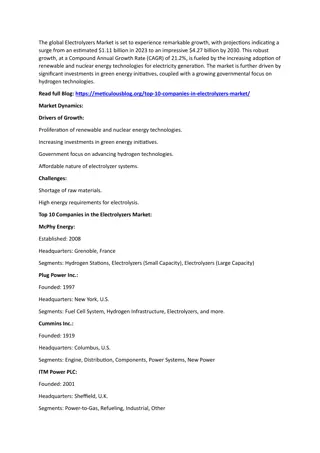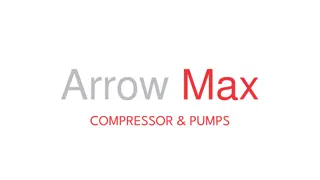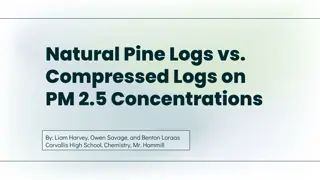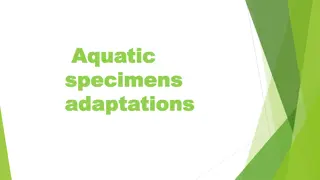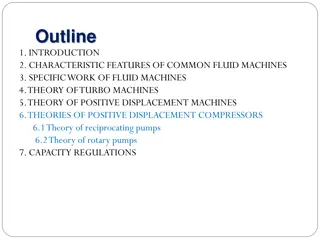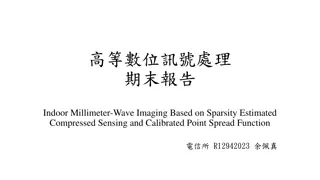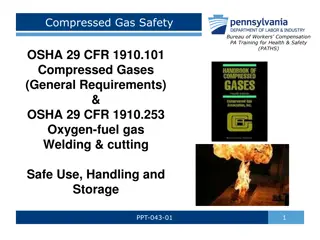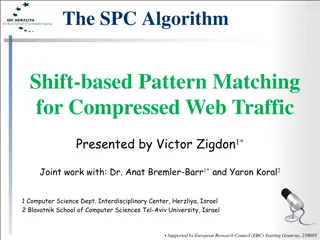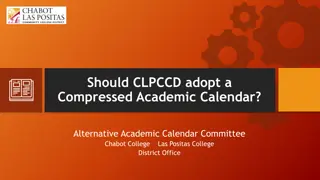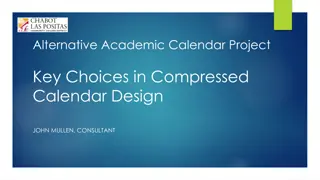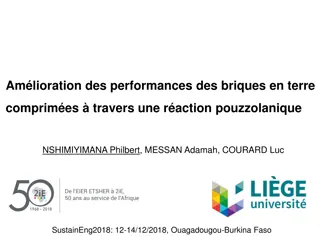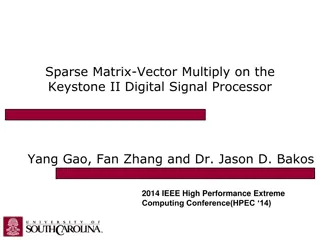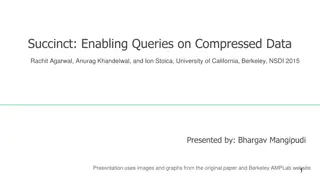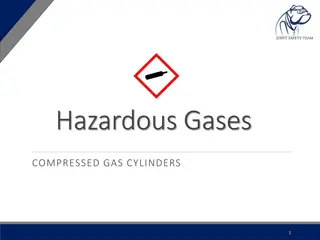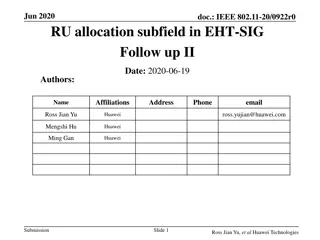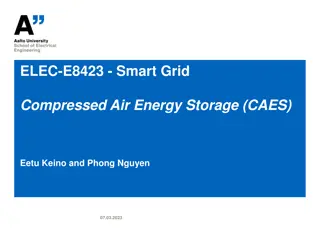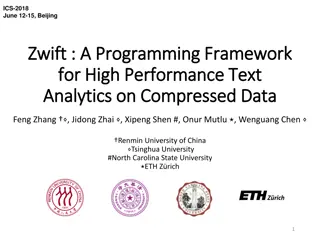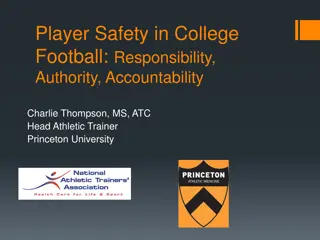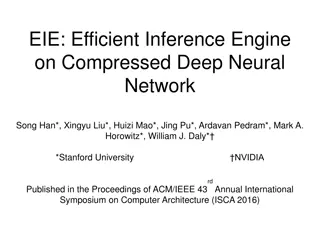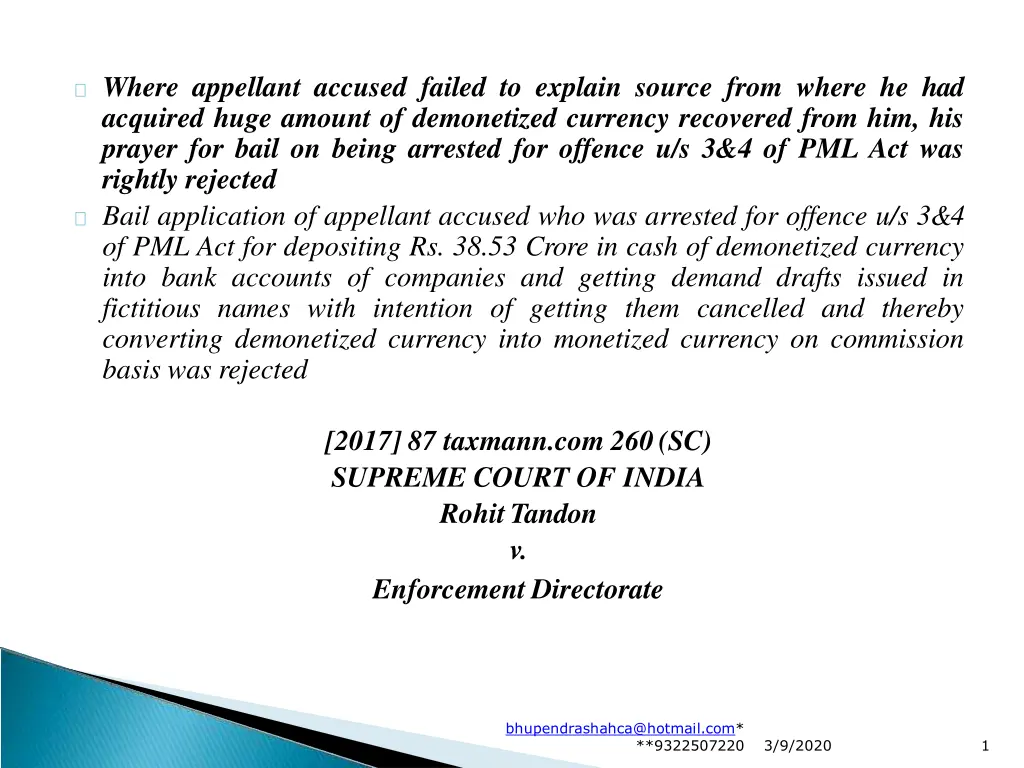
Bail Rejection for Money-Laundering Offence Upheld by Supreme Court
The Supreme Court of India rejected an appellant accused's bail application under the Prevention of Money Laundering Act for converting demonetized currency into monetized currency. Section 45(1) of the Act was declared unconstitutional due to violating Articles 14 and 21 of the Constitution. Cases where bail was denied will be reconsidered without the conditions of Section 45(1). Various legal cases regarding unexplained credits in books of assesses are also referenced.
Download Presentation

Please find below an Image/Link to download the presentation.
The content on the website is provided AS IS for your information and personal use only. It may not be sold, licensed, or shared on other websites without obtaining consent from the author. If you encounter any issues during the download, it is possible that the publisher has removed the file from their server.
You are allowed to download the files provided on this website for personal or commercial use, subject to the condition that they are used lawfully. All files are the property of their respective owners.
The content on the website is provided AS IS for your information and personal use only. It may not be sold, licensed, or shared on other websites without obtaining consent from the author.
E N D
Presentation Transcript
Where appellant accused failed to explain source from where he had acquired huge amount of demonetized currency recovered from him, his prayer for bail on being arrested for offence u/s 3&4 of PML Act was rightly rejected Bail application of appellant accused who was arrested for offence u/s 3&4 of PML Act for depositing Rs. 38.53 Crore in cash of demonetized currency into bank accounts of companies and getting demand drafts issued in fictitious names with intention of getting them cancelled and thereby converting demonetized currency into monetized currency on commission basis was rejected [2017] 87 taxmann.com 260 (SC) SUPREME COURT OF INDIA Rohit Tandon v. Enforcement Directorate bhupendrashahca@hotmail.com* **9322507220 1 3/9/2020
Section 45(1) of the Prevention of Money-Laundering Act, 2002, insofar as it imposes two further conditions for release on bail, to be unconstitutional as it violates Articles 14 and 21 of the Constitution of India Regard being had to the above, we declare Section 45(1) of the Prevention of Money- Laundering Act, 2002, insofar as it imposes two further conditions for release on bail, to be unconstitutional as it violates Articles 14 and 21 of the Constitution of India. All the matters before us in which bail has been denied, because of the presence of the twin conditions contained in Section 45, will now go back to the respective Courts which denied bail. All such orders are set aside, and the cases remanded to the respective Courts to be heard on merits, without application of the twin conditions contained in Section 45 of the 2002 Act. Considering that persons are languishing in jail and that personal liberty is involved, all these matters are to be taken up at the earliest by the respective Courts for fresh decision. The writ petitions and the appeals are disposed of accordingly. The conditions are that the Public Prosecutor must be given an opportunity to oppose any application for release on bail and the Court must be satisfied, where the Public Prosecutor opposes the application, that there are reasonable grounds for believing that the accused is not guilty of such offence, and that he is not likely to commit any offence while on bail. [2017] 87 taxmann.com 257 (SC) Nikesh Tarachand Shah bhupendrashahca@hotmail.com* **9322507220 2 3/9/2020
1. Any sum found credited in the books of an assessee 2. Assessee offers no explanation about the nature & source thereof, or Explanation offered is not satisfactory in the opinion of the A.O. 4. Onus is on the Assessee to prove identity, genuineness and creditworthiness of the creditor. 3. Consequences: the sum so credited may be charged as income of the assessee for that P.Y. (yearin which it is found credited) 3
CIT Vs. United Commercial and Industrial Co. (Pvt.) Ltd. (1991) 187 ITR 596 (Cal) CIT vs. Precision Finance Pvt. Ltd. (1994) 208ITR 465 (Cal) Korlay Trading Co.,. Ltd. (1998) 232 ITR 820 (Cal). Kamal Motors v. CIT [2003] 131 Taxman 155 (Raj.). CIT v. R.S. Rathore [1995] 212 ITR 390 (Raj.), Life Insurance Corporation of India vs. CIT (1996)219 ITR 410(SC) CIT vs. Metachem Industries (2000)245 ITR 160 (MP) CIT vs. Oasis Hospitalities Pvt. Ltd., 333 ITR 119 (Delhi)(2011). 4
DCIT v Rohini Builders (2002) 256 ITR 360 (Guj) Hastimal v. CIT 49 ITR 273(Mad.) Tolaram Daga v. CIT 59 ITR 632 (Assam) Nemichand kothari v. CIT 264 ITR 254 (Gau.) Murlidhar Lahorimal v. CIT 280 ITR 512 (Guj.) Exception : Proviso to Section68 5
No books:Cash frompast savings: Where the assessee did not maintain and hence did not produce any Home Chest Account though it was his case that the high denomination notes were savings from his personal allowance, there was no warrant for drawing an adverse inference. Assessee produced details of withdrawals for past 7 years, and claimed the amount encashed on demonetization as to be out of savings from such withdrawals, such an explanation can not be rejected by AO. -Sri SriNilkantha NarayanSinghvs. CIT [1951] 20ITR 8
Though section 68 of the Act may not be strictly applicable since the assessee was not maintaining any books of account and the bank statement cannot be considered as the assessee s books of account, on the basis of the judgment of the Supreme Court in the case of A. Govindarajulu Mudaliar v. CIT [1958] 34 ITR 807, it is the onus of the assessee to explain the cash received by him and if there is no explanation or acceptable evidence to prove the nature and source of the receipt, the amount may be added as the assessee s income on general principles and it is not necessary to invoke section 68, nor is it necessary for the income-tax authorities to point out the source of the monies received. Even if section 68 is not applicable, the cash deposit in the bank can be asked to be explained by the assessee under section 69 or section 69B of Act. [Manoj Aggarwal v. DCIT [2008]113 ITD 377 (DELHI) (SB)] 23
About "Nature and source" - General view: The expression "nature and source" has to be understood as a requirement of identification of the source and its genuineness. The Supreme Court in Kale Khan MohammadHanif v. CIT [1963] 50 ITR 1 pointed out that the onus on the assessee has to be understood with reference to the facts of each case and proper inference has to be drawn from the facts. Where the prima facie inference on facts is that the assessee's explanation is probable, the onus will shift to the Revenue. bhupendrashahca@hotmail.com***9322507220 8 3/9/2020
In the case of Bhaichand N. Gandhi 141 ITR 67 (Bom) it was held that, A CASH CREDIT FOR PREVIOUS YEAR SHOWN IN ASSESSEE'S BANK PASS BOOK ISSUED TO HIM BY BANK, BUT NOT SHOWN IN CASH BOOK MAINTAINED BY ASSESSEE FOR THAT YEAR WHETHER SUCH CASH CREDIT FALL WITHIN THE AMBIT OF SECTION 68 HELD, NO WHETHER PASS BOOK SUPPLIED BY BANK TO ASSESSEE IS A BOOK MAINTAINED BY ASSESSEE HELD, NO Followed in: Smt. Manasi Mahendra Pitkar 160 ITD 605 (Mumbai - Trib.) Smt. Madhu Raitani 10 ITR(T) 91 (Gauhati) (TM) Also a contrary view : In the case of Sudhir Kumar Sharma (HUF) [239 Taxman 264 (SC)] it was held that, SLP dismissed against High Court's ruling that where assessee had failed to give list of persons who advanced cash to him along with their confirmation in respect of huge amount of cash deposited in its bank account, Assessing Officer was justified in adding said amount to assessee's taxable income under section 68. bhupendrashahca@hotmail.com* **9322507220 9 3/9/2020
IT: Where assessee failed to produce relevant documents and confirmation in respect of loan taken from various parties, mere fact that he did not maintain proper books of account could not be accepted as a valid plea and, thus, amount in question was to be added to assessee's taxable income under section 68. 250 Taxman 362 (Bombay) Arunkumar J. Muchhala bhupendrashahca@hotmail.com* **9322507220 10 3/9/2020
Whether money for the purpose of Section69A? The expression money has different shades of meaning. In the context of income-tax provisions, it can only be a currency token, bank notes or other circulating medium in general use, which has the representative value. Therefore, the currency notes on the day when they were found to be in possession of the assessee should have had the representative value, namely, it could be tendered as a money, which has intrinsic value. When, the RBI refused to exchange the high denomination notes when they were tendered for exchange, they were only scrap of paper and they could not be used as circulating medium in general use as the representative value and, therefore, it could not be said that the assessee wasin possession of unexplained money. CIT vs. AndhraPradeshYarnCombines(P.)Ltd. [2006] 282ITR 490(Karnataka). 11
DICLOSURES REQUIRED UNDER THE COMPANIES ACT, 2013 Notification No. G.S.R. 308(E) dated 30th March 2017 issued by MCA required the companies to disclose the Details of Specified Bank Notes (SBN) held and transacted during the period from8thNovember, 2016to 30thDecember, 2016. Notification No. G.S.R. 307(E) dated 30th March 2017 issued by MCA required the auditor to incorporate in its audit report the following : (d)whetherthe company hadprovided requisite disclosuresin its financial statements as to holdings as well as dealings in Specified Bank Notes during the period from 8th November, 2016 to 30th December, 2016 and if so, whether these are in accordance with thebooks of accountsmaintainedbythe company. 12
DISCLOSURES REQUIRED IN ITRs Disclosure of cash deposited during the period was required to be made in the ITR forms if the cash deposited was Rs.200,000 or more. 13
Sr No. Nature and Value of Transaction Reporting person Cash deposit during the period 09.11.16 to 30.12.16 aggregating to- i. (i) Twelve lakh fifty thousand rupees or more, in one or more current account of a person; or i.) A banking company or a co- operative bank to which the Banking Regulation Act, 1949 applies; (ii)Two lakh fifty thousand rupees or more, in one or more accounts(other than a current account) of a person. ii.)Post Master General as reffered to in clause (j) of Section 2 of the Indian Post Office Act, 1898 i.) A banking company or a co- operative bank to which the Banking Regulation Act, 1949 applies; Cash deposits during the period 01.04.16 to 09.11.16 in respect of accounts that are reportable under Sr. No. 12 ii. ii.)Post Master General as reffered to in clause (j) of Section 2 of the Indian Post Office Act, 189821
The Taxation Laws (Second Amendment) Act, 2016 Tax on income referred to in section 68, 69, 69A, 69B, 69C or 69D whether included in ROI or added by AO tax rate 60% (from 30%) Finance Act 2017 provides for a surcharge on such income at 25% of tax. Effective rate becomes 75.00% + Cess( upto AY 2018-19 3%) from AY 2019-20 - 4%) 15
Amendment to Section 115BBE by The Taxation Laws (Second Amendment) Act, 2016 Whether applicable for entire F.Y. 2016-17? Legislations which modified accrued impose obligations or impose new duties or attach a new disability have to be treated legislative intent is clearly retrospective effect; unless the legislation is for purpose of supplying an obvious omission in a former legislation or to explain a former legislation. rights or which as prospective unless the to give the enactment a - CIT v. Vatika Township (P.) Ltd. [2014]367 ITR 466(SC). 16
Assurances given by Officials Immediately after demonetisation, an assurance was given by the Government that cash deposit upto Rs. 2,50,000/- shall not be inquired in the cases of small businessman, housewives, artist, labour, etc. through advertisements and media. Thereafter, Hon ble Prime minister on 12/11/2016 made a public announcement that deposit of notes upto Rs. 2,50,000/- made by married woman will not be subject to any sort of inquiries. But, no official circular was issued in this regard. Representation was made by CTC vide representation dated 14/11/2016 requesting to clarify this issue by way of Circular. No Circular is issued clarifying the same. Instead we have amendment which does not have any threshold limit. Even small amount of Rs. 50,000/- can be covered u/s 115 BBE. 27
Allowed: CIT v. Chensing Ventures [2007] 291 ITR 258 CIT v. Shilpa Dyeing & Printing Mills (P.) Ltd [2013] 219 Taxman 279(Guj.) Not Allowed: Kim Pharma (P) Ltd v. CIT [2013] 258 CTR 454 (P&H) relying on Fakir Mohmed Haji Hasan v. CIT [2001] 247 ITR 290 (Guj.) CBDT Circular No. 11/2019dt. 19/06/2019: Para 4 of the said circular CBDT have clarified that assessee is entitled to claim set-off of loss against income determined u/s. 115BBE till AY 2016-17 FromAY 2017-18- Section 115BBEamended. No set off of loss or allowance against deemed income u/s 68, 69, 69A, 69B or 69C. 18
Onus is on assessee to prove positively the source and nature of an amount received by him in accounting year, and if he fails to discharge that onus, income-tax authorities are entitled to draw an inference that amount received was of an income nature. Where assessee not having satisfactorily proved source and nature of amount which he encased on demonetization, revenue authorities were perfectly justified in drawing an inference that said sum was of an income nature. -Chunilal Rastogi vs. CIT [1955] 28ITR 341 (Pat.) -Anil KumarSingh vs. CIT [1972] 84ITR 307 (Cal.) -M. L. Tewaryvs. CIT [1955] 27 ITR 630 (PAT.) 19
Cash in handinbooks: Where amount en-cashed on demonetization was part of cash balance in the books of account, AO can not disbelieve a part of such cash balance as being not of specified denominations, when the books are not rejected. -Lalchand BhagatAmbicaRamvs. CIT [1959]37 ITR 288(SC). Affidavit of payers: When assessee submitted books of account showing relevant entries showing payment being made to them which resulted in cash in its books and also submitted affidavits of payers, Revenue authorities can not hold that it was not possible that all payments after a particular date were being made in multiples of Rs. 1000. No addition can be sustained based on pure surmise. - MehtaParikh& Co. v. CIT [1956]30ITR 181 (SC). 20
Cash in handdenominationof notes It was possible that even in a cash balance of a very large amount there may be no high denomination notes at all. Equally it was possible that even , in a cash balance of a small amount almost the entire cash balance may be made up only of high denomination notes. When both the possibilities were there, it could not be said that those or any of them represented the income of the assessee from some undisclosed source. -Gur PrasadHariDas vs. CIT [1963]47ITR 634(All.) 21
Logical to keepcashin high denomination notes: If the cash balance of the assessee-company was steadily increasing it would not be at all unreasonable to accept the explanation given by the assessee-company that, for the sake of convenience, the cash balance was being kept in high denomination currencynotes. High denomination currency notes could be stored more easily and, at the time of accounting, they would have facilitated counting. Since the balance was increasing steadily, the assessee might not have felt it necessary to keep the balance in currency notes of low denomination . Such an explanation by assessee is not an unreasonable explanation. - KanpurSteelCo. Ltd.v. CIT [1957]32ITR56(ALL.) 22
Amount credited in business presumed as business receipt. books can normally be When an amount is credited in business books, it is not an unreasonable inference to draw that it is a receipt from business, if the explanation given by the assessee as to how the amounts came to be received is rejected by all the income- tax authorities as untenable 23
Provisions for Taxation of unexplained investment, cash and other assets Tax (S. 115BBE) Flat rate of tax @ 30% + surcharge + cess (No expenses, deductions, set off is allowed) Tax (S. 15BBE) Flat rate of tax @ 60% + surcharge @ 25% (i.e.15% of such income) + Education cess. So total is 7.25% approx. (No expenses, deductions, set off is allowed) credit, Provisions for Taxation of unexplained investment, cash and other assets credit, Penalty Assessing determines income referred to in S.115BBE, penalty 10 % of tax payable shall be levied; entailing total payment of 83.25% (S.271AAC) If Officer bhupendrashahca@hotmail.com* **9322507220 24 3/9/2020
CBDT Instruction No. 1916, dt. 11th May, 1994, 120 Taxation (St.) 98. The High Denomination 1978 - Constitutionally valid Jayantilal Ratanchand Shah v. Reserve Bank of India &Ors AIR 1997 SC 370. Banks Notes (Demonetisation) Act, Can the Legislature increase tax rate on deposits retrospectively ? Or Can penalty provision be amended retrospectively to include cash deposits ? J.K Synthetcs Ltd. v Commercial Tax Officer (1994) 119 CTR 222( SC) / 1994 AIR 2393 ( Five judges Bench ) As per well-established law provision regarding levy of penalty and increased rate are in the nature of substantive law and not adjective law. West Ramnad Electric Distribution Co Ltd v State of Madras 1962 AIR SC 1753 Penal statutes are generally considered prospective. bhupendrashahca@hotmail.com* **9322507220 25 3/9/2020
Pyare Lal Sharma v. M.D. J & K Industries AIR 1989 SC 1854 It is the basic principle of natural justice that no one can be penalized on the ground of conduct which was not penal on the day it was committed National Agricultural Co operative Marketing Federation of India Ltd v UOI (2003) 260 ITR 548 (SC) Govt. has the power to make the law retrospectively, subject to several restrictions. bhupendrashahca@hotmail.com***9322507220 54 3/9/2020
Hitendra Vishnu Thakur v State of Maharashtra AIR 1994 SC 2623 A statute which affects substantive rights is presumed to be prospective , either expressly or by necessary intendment. In the year 2004, S. 111A had been amended with an amendment brought in the middle of the financial year making the same applicable to the entire financial year, but it was specifically stated therein, the transaction of sale of such equity share or unit is entered into on or after the date on which Chapter VII of the Finance (No. 2) Act, 2004 comes into force making the intention of the statute clear and unambiguous unlike the Tax Amendment in 2016. bhupendrashahca@hotmail.com* **9322507220 27 3/9/2020
Star Television News Ltd v. UOI (2009) 317 ITR 66 (Bom.) (HC) UOI v Star Television News Ltd .( 2015) 373 ITR 528 (SC) CIT v. Vatika Township ( 2014) 367 ITR 466 (SC) (FB)( Five judges) It is arbitrary Retrospective No rationale Penalty cannot be levied in respect of transactions taken place prior to the proposed Bill and which has became Act , No accountability on the part of Assessing Officer Discretion will be misused bhupendrashahca@hotmail.com* **9322507220 28 3/9/2020
Cash is deposited on different dates, can the Assessing officer make the addition presumption that cash declared did not consist of Rs. 1000 or Rs. 500 Notes ? on the Ans : No, such adverse inference presumption can be made . Narendra G. Goradia v. CIT ( 1998 ) 234 ITR 571 (Bom) (HC) CIT v. Associated Transport Pvt . Ltd . (1995) 212 ITR 417 (Cal) (HC) CIT v. Laxmandas Bhatiya (1996) 217 ITR 878 ( MP) (HC) Bat Velbai v. CIT (1963) 49 ITR 130 (SC)Lakshmi Rice Mills v. CIT (1974) 97 ITR 258 (Pat) (HC) ITO v. ITAT ( 1998) 229 ITR 651 ( Pat) (HC ) G.K . Padmaraju v. CIT ( 1964) 51 ITR 412 (AP) (HC) bhupendrashahca@hotmail.com* **9322507220 29 3/9/2020
Scheme applies to all incomes covered under sections 68 to 69D, whether in form of cash, bank deposits jewelry, property etc Cash may or may not be in form of demonetized notes Scheme applies to crime monies also Scheme applies to all categories of assessees ie. Individual , HUF, BOI, AOP ,Trust, Companies Act etc. Scheme applies to both resident or non resident Scheme applies to assesses covered under Presumptive Taxation Scheme (Sections 44AD, 44ADA, 44AE) Scheme applies to assessment years 2017-18 and on wards Income chargeable under Black Money Act, 2015, cannot be declared bhupendrashahca@hotmail.com* **9322507220 30 3/9/2020
In Karimtharuvi Tea Estate Ltd. v. State of Kerala [1966] 60 ITR 262 (SC), it was held: "10. Now, it is well-settled that the Income-tax Act, as it stands amended on the first day of April of any financial year must apply to the assessments of that year. Any amendments in the Act which come into, force after the first day of April of a financial year, would not apply to the assessment for that year, even if the assessment is actually made after the amendments come into force." Emphasis supplied] bhupendrashahca@hotmail.com***9322507220 31 3/9/2020
In Scindia Steam Navigation Co. Ltd. v. Commissioner of Income- tax [1954] 26 I.T.R. 686, a Division Bench of the Bombay High Court, considered the question-as to the effect of an amendment which came into force after the commencement of the financial year. The facts in that case were these. The assessee's ship was lost as a result of enemy action. The Government paid the assessee in 1944 a certain- amount as compensation which exceeded the original cost of the ship. The Income-tax Officer included the difference between the original cost and the written down value of the ship in the total income of the assessee for the assessment year 1946- 47. The Tribunal upheld that decision and referred the question, whether the sum representing the difference between the original cost and the written down value was properly included in the assessee's total income computed for the assessment year 1946-47. It was argued that the fourth proviso to section 10(2)(vii) of the Income-tax Act (inserted by the Amendment Act of 1946 with effect from May 4, 1946) under which the inclusion of the amount was justified by the department, had no application to the case. bhupendrashahca@hotmail.com***9322507220 32 3/9/2020
The learned judges held that: "as it was the Finance Act of 1946 that imposed the tax for the assessment year 1946-47, the total income had to be computed in accordance with the provisions of the Income-tax Act as on April 1, 1946; that as the amendments made by the Amendment Act of 1946 with effect from May 4, 1946, were not retrospective, they could not be taken into consideration merely because the assessee was assessed after that date ; and that the assessee was not liable to pay tax on the sum because the fourth proviso to section 10(2)(vii) of the Income-tax Act under which it was sought to be taxed was not in force in respect of the assessment year 1946-47". The Supreme court affirmed this decision in CIT v. Scindia Steam Navigation Co. Ltd. [1961] 42 I.T.R. 589(SC) bhupendrashahca@hotmail.com***9322507220 33 3/9/2020
During the string of surveys conducted by the department the following violations/ irregularities/ deficiencies were noted in the functioning of co-operative societies : 1.Non-filing of income tax returns. The reason given by some of them was that since they are covered u/s 80P deductions they don't need to file returns. 2.Non-compliance with statutory tax audit. 3.Non-maintenance of KYC norms - no PAN database of members 4.Large cash transactions without PAN. 5.Use of "cheque-books" wherein at par cheques or cash withdrawal slips are issued by members to third-parties which leads to non tracking of money trail- potentially leading to tax evasion and money laundering bhupendrashahca@hotmail.com* **9322507220 34 3/9/2020
6.Large volume cash advances and loans and subsequent repayment in cash. 7.Department is in litigation against the societies with regard to 80P deduction, while in most surveys it was seen that the societies were carrying out business akin to banks. 8.Several violations of the bye-laws of the societies themselves were seen in a few cases. bhupendrashahca@hotmail.com* **9322507220 35 3/9/2020
Madhuri Das Narain Das vs. CIT [ 67 ITR 368 (Allahabad)] Section 4 of the Income-tax Act, 1961 [Corresponding to section 3 of the Indian Income- tax Act, 1922] Income Chargeable as Assessment year 1947-48 Assessee encashed 28 high denomination notes of Rs. 1,000 each after issuance of High Denomination Bank Notes (Demonetisation) Ordinance, 1946 When asked to explain source of said notes, assessee submitted that same had come out of closing cash balance of its business ITO disbelieved explanation and treated entire amount as assessee s income from an undisclosed source Tribunal accepted that 22 notes could have come out of cash balance of Rs. 38,000 and odd, and remaining 6 notes could not have formed such balance Whether finding of Tribunal, being based upon surmises and conjectures, could not be upheld Held, yes HC held that finding of Tribunal was based upon surmises and conjectures and cannot be upheld. HC relied on coordinate bench ruling in Kanpur Steel Co. v. CIT [[1957] 32 ITR 56 ]. In view of decision of the Allahabad High Court in Kanpur Steel Co. v. CIT [1957] 32 ITR 56 the finding of the Tribunal that where as 22 high denomination notes out of a total of 28 high denomination notes could form part of the assessee s cash balance, the remaining 6 high denomination notes could not form part of such balance, was based on surmises and conjectures and the same could not be upheld. bhupendrashahca@hotmail.com***9322507220 36 3/9/2020
Gur Prasad Hari Das vs. CIT [47 ITR 634 (ALL.)] Assessment Addition to income - Assessment year 1947-48 On demonetisation of high denomination notes assessee encashed 21 such notes, part of which were held, by Tribunal as his income from undisclosed sources on ground that same could not be satisfactorily explained by assessee Whether, prima facie value represented by high denomination notes in possession of assessee must be presumed to be part of his cash balance and if department wanted to treat such value as his concealed income from some undisclosed sources, it was for department to establish that fact on basis of material in their possession Held, yes Whether in view of fact that Tribunal accepted assessee s case atleast with regard to eight notes and further that it made its own estimate of cash balance of assessee confining some proportion of high denomination notes implying thereby possibility of assessee receiving such notes during course of his business, Tribunal committed an error in not accepting assessee s explanation in toto in regard to all notes Held, yes Whether, in view of aforesaid, there was no material before Tribunal for holding that assessee could not have been in possession of any of remaining thirteen notes also and that those notes or any part of them represented income of assessee from some undisclosed sources Held, yes bhupendrashahca@hotmail.com***9322507220 37 3/9/2020
Naresh Kumar Tulshan vs. Fifth IncomeTax Officer [ 11 ITD 537 (BOM)] In the present case, assessee deposited high denomination notes in bank declaring their source as past profits. In subsequent statement however during survey, the source was given as withdrawal from a partnership firm , but examination in firms book made possession of such high denomination cash by firm on date of withdrawal improbable and thus Bombay HC held that the ITO was justified in treating the impugned high denomination cash as assessee s income as unexplained money u/s 69A and was made taxable.It was held that there was a clear contradiction in the two statements of the assessee about the source of the impugned amount. Had the source of the notes been his past profits as stated on 19-1-1978, there was no necessity for him to state subsequently that the amount had been withdrawn from the firm. Clearly if it represented his past profits, there was no need for any withdrawal from the firm. Also, the certificate of the firm was in general terms and there was no other contemporaneous evidence to corroborate the assessee s case. Even the firm itself had not explained the source of high denomination notes worth more than Rs. 6 lakhs and had asked for a settlement.Considering all the evidence produced by the assessee, the conclusion would be that the notes were never part of the firm s cash and the assessee had not been able to establish this fact. The lower authorities were, accordingly, justified in making the addition bhupendrashahca@hotmail.com* **9322507220 38 3/9/2020
In the case of Sreelekha Banerjee [49 ITR 112 (SC)] it was held that, Whether if there is entry in account books of assessee which shows receipt of sum on conversion of high denomination notes tendered for conversion by assessee himself, it is necessary for assessee, if asked, what source of that money is and to prove that it does not bear nature of income - Held, yes - Whether where assessee contended that high denomination notes represented not cash balance but some other money and he failed to explain source of said money, department was justified in treating value of said high denomination notes as income of assessee from undisclosed sources - Held, yes. bhupendrashahca@hotmail.com* **9322507220 39 3/9/2020
In the case of Associated Transport (P .) Ltd. [212 ITR 417 (Calcutta)] it was held that, Assessing Officer treated high worth Rs. 81,000 denomination notes disbelieving assessee's explanation as to how he came into possession of same and added same in income of assessee and also imposed penalty - Tribunal found that assessee had sufficient cash in hand and in books of account of assessee cash balance was usually more than Rs. 81,000 - It, deleted addition and cancelled penalty - Whether finding of Tribunal being on basis of appreciation of facts against which no question of perversity had been raised, Tribunal was right in deleting addition and consequent penalty - Held, yes. as unexplained money, bhupendrashahca@hotmail.com* **9322507220 40 3/9/2020
In case of receipt of money by way of encashment of HDNs, the burden to prove the source of money and its nature rests solely on assessee - Anil Kumar Singh v. CIT 84 ITR 307 (Cal.) Value of HDNs was not assessable as income from undisclosed sources if cash balance shown in accounts of assessee was sufficient to cover HDNs and value of HDNs formed part of cash balance of the assessee. Only source of receipt of money has to be disclosed and not the source of receipt of HDNs which were legal tenders at the relevant time - Lakshmi Rice Mills v. CIT [1974] 97 ITR 258 (Pat.) HDNs could not be treated as income from undisclosed sources just because it was not mentioned in books that cash balance consisted of HDNs - ChunilalTikamchand Coal Co. Ltd. v.CIT [1955] 27 ITR 602 (Pat.) Tribunal could not make addition of undisclosed income where HDNs encashed by assessee were savings from his personal allowance - Sri SriNilkantha Narayan Singh v. CIT [1951] 20 ITR 8 (Pat.) bhupendrashahca@hotmail.com* **9322507220 41 3/9/2020
F. No. 225/391/2017/ITA.II Government of India Ministry of Finance Department of Revenue (CBDT) North Block, New Delhi, the 24th of November, 2017 To All Principal Chief-Commissioners of Income-tax/Directors-General of Income-tax Sir/Madam, Subject: Some of the important issues to be considered while framing scrutiny assessments pertaining to filing of revised/belated returns by assessees, post- demonetisation-reg.- Post-demonetisation, it was found that some of the assessees tried to build an explanation for cash deposits in their bank account(s) by manipulating their books-of-accounts and filing revised/belated income-tax returns. In this regard, Finance Ministry issued a Press Release dated 14th December 2016 in which it had cautioned that post-demonetisation exercise, provisions of Income-tax Act, 1961 ( Act ) which permitted filing of a revised or a belated return in certain situations should not be misused. The Release further stated that any instance of a revised/belated return of income coming to the notice of Income-tax Department which reflected any manipulation of book-of-accounts, cash-in-hand, profits etc. to justify the cash deposit being made in bank-account(s) might lead to taking necessary action under the relevant provisions of the Act by Income-tax Department. Based upon risk-assessment, several of such cases were selected for scrutiny in Computer Aided Scrutiny Selection (CASS) during this financial year. bhupendrashahca@hotmail.com* **9322507220 42 3/9/2020
2. Under the Act, revision of income-tax return is allowed only if any omission or wrong statement is discovered therein by the concerned assesse. Such omission or wrong statement should have occurred due to a bonafide inadvertent error or a mistake on the part of the assesse. Therefore, in situations where enquiries/verification in course of assessment proceedings suggest manipulations made fictitiously merely to build an explanation for cash deposits in bank account(s), the revised return itself becomes questionable and therefore, the transactions disclosed in it which are over and above the original return are liable to be taxed under anti-abuse provisions of the Act. Similarly, in case of a belated return, it would be crucial to examine the trend and business practices of a particular assessee while ascertaining the legitimacy of the transactions disclosed in a belated return, filed post-demonetisation. In such cases already under scrutiny, some instances which might indicate that assessee had filed revised or belated return merely as a cover up to explain the cash deposits in bank accounts are: i. Unsubstantiated reduction in closing stock in the revised return vis-a-vis the figures in original return; ii. Reporting of higher sales in the revised return; iii. Cash-in-hand as on 31.03.2016 or 31.03.2015 was enhanced in the revised return; iv. Additional cash inflow claimed to be out of earlier year savings, receipt of loans/advances /gifts/repayments/sale of capital assets; v. In some cases, cash outflow might have been reduced by paying some of the liabilities in cash; vi. Significantly lower closing stock as on 31.03.2015 or 31.03.2016 as compared to the earlier years in a belated return; bhupendrashahca@hotmail.com* **9322507220 43 3/9/2020
In such scenarios, following issues may be kept in consideration during verification and framing assessments- I. The claim of enhanced sales may be compared with the Central Excise/VAT returns; II. Whether the parties to whom additional sales were disclosed have identity, creditworthiness and transaction was genuine or not; III.Where the accounts are subjected to tax-audit, whether omission or wrong statement in the original return was pointed out by the audit or not; IV.The source of cash in hands of the person who had made payments to the assesse has to be verified carefully; V.The past profile of the concerned assessee should be thoroughly analysed; VI.Where as a result of enquiries/investigations it emerges that figures in the revised/belated return are fudged, the figure of manipulated receipts/sales/stock etc. is liable to be taxed as a cash credit under section 68 and not merely on net profit basis; VII. Any undisclosed expenditure detected after reduction of cash in hand by the assesse may be verified carefully; of bhupendrashahca@hotmail.com* **9322507220 44 3/9/2020
VII. . Significantly higher cash-in-hand as on 31.03.2016 or 31.03.2015 compared to the preceding year in a belated return. VIII.Unaccounted income so assessed in scrutiny assessment is liable to be taxed at a higher rate without any setoff of losses, expenses etc. under section 115BBE of the Act; IX.In the scenario pertaining to Wealth tax returns of earlier years, it should be examined whether there is an attempt to build cash in-hand or any other asset so as to justify deposit of cash, post-demonetisation. The above guidance note may be brought to the notice of field authorities in your charge. The above guidelines are only suggestive. Therefore, depending upon specific facts and circumstances of a particular case, Assessing Officer should also look into other relevant issues as well. Yours faithfully, (Rohit Garg) Director-ITA.II, CBDT bhupendrashahca@hotmail.com* **9322507220 45 3/9/2020
IT-I : Where AO made addition to assessee's income in respect of excess stock by invoking of provisions of sec. 115BBE, in view of fact that amended provisions of sec. 115BBE were applicable with effect from 1-4-2017 and not prior to that, impugned addition was to be set aside IT-II: Where assessee had occupied part of house for his residential purposes during year under consideration, ALV for last year for entire house could not be adopted as ALV of part portion of house let out by assessee Disallowance under section 14A cannot exceed amount of exempt income and further if there is no exempt income, no disallowance can be made IT-III: Disallowance under section 14A cannot exceed amount of exempt income and further if there is no exempt income, no disallowance can be made [2018] 96 taxmann.com 373 (Jaipur - Trib.) IN THE ITAT JAIPUR BENCH Assistant Commissioner of Income-tax, Central Circle-1, Jaipur v. Satish Kumar Agarwal bhupendrashahca@hotmail.com* **9322507220 46 3/9/2020
Addition made on the basis of jump in sales without verification was deleted (Agson Global Pvt. Ltd vs. ACIT (ITAT Delhi) Whether there was no necessity whatsoever for assessee to maintain addresses of cash customers - Held, yes - Whether, therefore, rejection of book results of assessee was unjustified - Held, consequently, additions made to assessee's income were liable to be deleted - Held, yes R.B. Jessaram Fetehchand (75 ITR 33 Bombay) yes - Whether, bhupendrashahca@hotmail.com* **9322507220 47 3/9/2020
Sets-aside addition u/s. 69A; Considers 'e-assessment' limitations, remits matter States that electronic proceedings, though laudable, can lead to erroneous assessment if officers are not able to understand the transactions and statement of accounts of an assessee without a personal hearing ; AO's 'demonetisation' deposit assessment bhupendrashahca@hotmail.com* **9322507220 48 3/9/2020
Gordhan v. Dy. CIT dated 19/10/2019 held that " no addition can be made u/s 68 on the sole reason that there is a time gap of 5 months between the date of withdrawals from bank account and redeposit the same in the bank account , Unless the AO demonstrate that the amount in question has been used by the assessee for any other purpose. In my view addition is made on inferences and presumptions which is bad in law. Delhi ITAT CIT v. Baldev Raj Charla [2009] 121 TTJ 366 (Delhi) Kulwant Rai [2007] 163 Taxman 585/291 ITR 36 cash flow statement must be considered. bhupendrashahca@hotmail.com* **9322507220 49 3/9/2020
This view has been held by the Hon 'ble Supreme Court in the case of CIT v. Devi Prasad Vishwanath Prasad [1969] 72 ITR 194 that "It is for the assessee to prove that even if the cash credit represents income, it is income from a source, which has already been taxed". The assessee has already offered the sales for taxation hence the onus has been discharged by it and the same income cannot be taxed again. Reliance can also be placed on the decision of Hon'ble Supreme Court in the case of CIT v. Durga Prasad More [1969] 72 ITR 807 in which it was held"If the amount represented the income of the assessee of the previous year, it was liable to be included in the total income and an enquiry whether for the purpose of bringing the amount to tax it was from a business activity or from some other source was not relevant". Reliance can be placed on the decision of Hon 'ble Rajasthan High Court in the case of Smt. Harshila Chordia v. ITO [2008] 298 ITR 349 in which it was held that"Addition u/s 68 could not be made in respect of the amount which was found to be cash receipts from the customers against which delivery of goods was made to them". In the decision of Hon'ble ITAT, Nagpur Bench in the case of Mis Heera Steel Ltd. v. ITO [2005] 4 ITJ 437 is also worth to be mentioned here that wherein it was held that"Both the lower authorities failed to appreciate the case of the assessee that these were the trade advances and not cash credits and against such advance, the assessee has supplied the material in due time as per details available on record. In view of the above, there is no justification for the revenue authorities to treat these cash advances as unexplained cash credit u/s 68". bhupendrashahca@hotmail.com* **9322507220 50 3/9/2020

